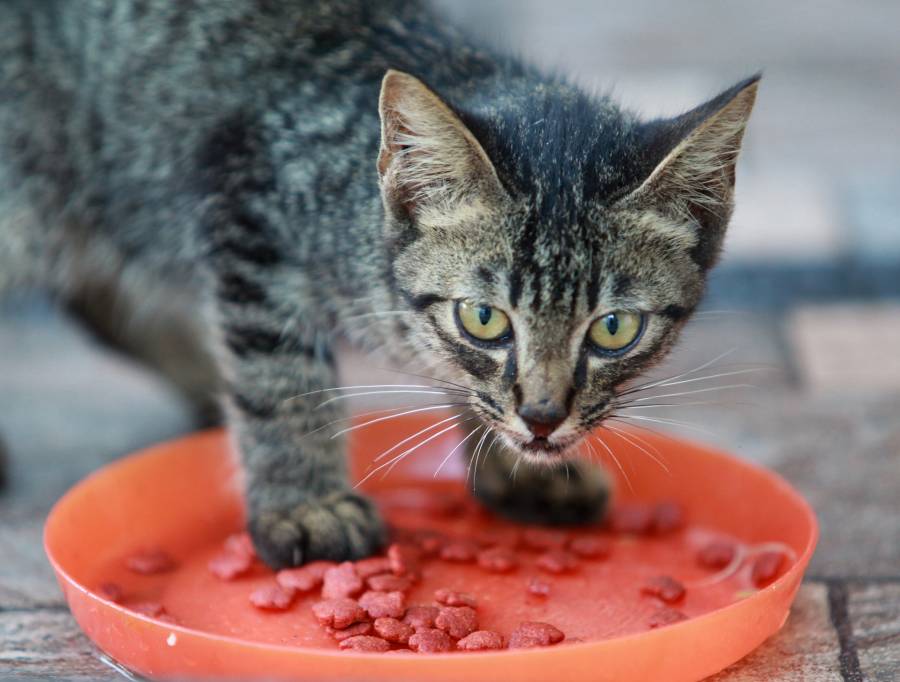Quick Navigation
Your cat just had kittens, and here comes the question of what to feed these kittens.
Or you probably just got kittens, and you don’t have any prior experience with handling kittens.
You wonder what would be the best meals to feed your kitten to help them develop and grow healthy.
You might be tempted to feed your kitten regular cat food because, in your defense, that is what cats are supposed to be fed.

Cats all eat regular cat food. Or is there an exception when it comes to kittens?
Why Normal Cat Food Should Not Be Fed To Kittens
You can not feed kittens the same way as an adult cats because these cats require different diets.
It is not ideal for feeding them the same thing due to their unique diet requirements. Kittens are just like human babies.
You do not feed human babies adult food because they have just been born, and their body system is not ready yet to accept adult food.
You should never feed kittens the same food you would feed adult cats.
It is risky to feed your kitten regular cat food, and this can also pose some threatening health issues for your kitten when they start to develop.
Feeding your kitten regular cat food as soon as it is born can impede and stall its growth.
You will notice that your kitten is not growing as it is supposed to.
If you compare kittens that have been fed the right formula and food after birth and kittens fed with regular cat food, you will notice a staggering difference.
Their growth and development will be vastly different when compared. The kitten given regular cat food will also probably have health challenges.
A Diet Filled With Protein And Calories
Kittens need a healthy amount of protein and calories in their diets to keep them growing and developing typically.
Protein and calories are responsible for the energy that your kitten will need as it grows.
Regular cat food does have calories, but it may also lack a sufficient amount that your cat may need.
Regular cat food can not give your kitten the amount of protein that it will need to keep it developing as expected.
It is one of the reasons why it is not advised to give your kitten regular cat food.
Regular cat food also contains a high load of fatty contents that your kitten shouldn’t be taking at a very young age.
Taking regular cat food with a high amount of fat can lead to serious health challenges for your kitten.
It could block some vital arteries and veins because these body parts have not developed fully to break down fats.
Your kitten does not need so much fat at such a young age as it does not contribute in any way to your kitten’s growth or development.
Specially made formulas that have been precisely made for newborn kittens are what your kitten needs in her diet.
Formulas are usually carefully prepared with the right amount of proteins and calories your kitten needs.
The proteins present in formulas will aid your kitten in its growth.
A Diet With Milk
Your kitten, most importantly, needs milk.
Milk from its mother’s breasts is exceptionally crucial to your kitten’s growth.
Sometimes, a veterinary clinic or a pet store may recommend a particular milk brand that you may feed your kitten in a situation where the mother is absent.
Try by all means to avoid cow milk when you are feeding your kitten.
Your kitten will rely on formulas and milk, especially from a day old to about four weeks old.
Formulas and milk will make up your kitten’s diet at this time since it is not mature enough to feed off solid food, in this case, regular cat food that other mature or adult cats may be eating.
You must carry out thorough research on what kind of formula you should be feeding your kitten.
Some kittens are allergic to specific formulas. It would be best if you also took note of that.

The Right Age For Normal Cat Food
Four weeks after your kitten has been born, you can start to explore other cat food options or solid cat food.
You can start incorporating small amounts of wet cat food into your kitten’s diet.
Wet cat food is usually easily digestible by kittens. At four weeks old, your kitten can not eat regular food still.
You have to make sure that you do not feed it regular cat food as it is not fully developed to have it in its diet.
Kittens should eat a variety of wet cat food.
When your kitten is up to eight months to a year old, you can explore regular cat food options.
At this age, your kitten is now a fully-grown cat and can ingest solid foods without them being a potential threat to their health.
At this age also, cats need those added calories, fats, and proteins to develop and mature healthily.
Protein at this age will not be adequate for their growth as they will need added food supplements.
Foods To Feed Your Kitten At Her Right Age
Kittens should be able to meet all of their nutritional needs from their mother’s milk for the first four weeks of life.
Weaning begins at around 4 weeks of age, and over the following 4 weeks, kittens should be gradually introduced to solid food, with more wet or canned food than dry food.
As a result, canned or wet food is easier to consume because small kitten teeth can struggle with dry food.
When kittens are two months old, they should have finished weaning and only be consuming commercially prepared kitten food, either wet or dry or a combination of the two.
Kittens grow the most rapidly during their first 24 weeks of life.
Kittens are still developing on the inside even if they appear to be fully grown by the time they reach 6 months of age.
Cats will actually gain up to 50 times more body weight than they did at birth during the first year of their lives.
For this reason, it’s important to continue giving a kitten formula until all of this growth stops.
Canned Cat Foods
The variety of ingredients available in canned cat foods makes them excellent.
While you introduce your kitten to different foods and tastes, the cat can try shrimp, fish, various sorts of poultry, etc.
Additionally, some canned food have other ingredients (such as vegetables) while others are only meats.
She frequently receives a spoonful as a treat or as an addition to her regular diet.
Many cat owners use canned foods as training treats when teaching their cats.
Scrambled Eggs
When you make yourself scrambled eggs on a Sunday morning, complete it with melted cheese, and offer your kitten a spoonful.
It’s good nutrition, and your kitten will like it.
Fresh And Salt Water Fish
Your kitten will be happy if you share your cooked fish with her.
Kittens will appreciate a small amount of trout, catfish, salmon, or tuna. Any cooked fish is ok.
Salad Greens
Although cats are obligatory carnivores, meaning they’re carnivores that have to eat meat, adding some vegetables to your kitten’s diet will add fiber and a few vitamins and minerals.
There may also be a few florets of broccoli, some diced lettuce, or other salad greens. A pinch at a time is ok.
Squash And Pumpkin
If you are cooking squash or pumpkin for your family, put aside a touch for your kitten.
Grate a little piece of the squash or pumpkin and place it on a towel.
Cover it with a humid towel. Microwave for just a couple of seconds, just until it’s cooked.
Please wait until it cools, then offer your kitten a little from it. Refrigerate the remainder for another day.
Conclusion
It might not be obvious trying to figure out what your kitten should eat, especially as a new pet owner.
If you can carry out your research appropriately, you will find out what will work for your kitten.
You can also visit a veterinary clinic so that they can help you set up a meal plan that will be appropriate for your kitten.
You can be sure that no errors because a professional will create the meal plan if you let a veterinary clinic handle it for you.
However, keep the ten rules in mind when offering your kitten any of the different foods listed above.
Anything you input in your kitten’s daily diet shouldn’t account for more than 10% of the total daily calories, as any longer than 10% could upset the nutritional balance of food.
Additionally, offer one new item at a time. Allow your kitten to taste and understand that food before offering anything else.
With those thoughts in mind, have fun. Enjoy your kitten’s food explorations!

Zoey is a long-time pet owner and animal rights advocate, a vital part of Purrfect n’ Pawesome. She shares her unique experiences and learnings with her readers to enhance their understanding of pet behavior and nutrition. Along with being an active pet writer, she volunteers at multiple animal shelters, rescue centres with some bespokenly awesome pets.
Zoey has a lot to share when raising the pets and spending life being their true friends. She has a quite pampered Persian cat and a Ragdoll, whom she loves the most. Readout her blogs to know more about being a responsible parent to your beloved pets.
“I love to be around cats and dogs; that’s my passion and my trick to get away from all the negativity and soaking in unconditional love and affection. Being attached to this platform gives me the reason to be vocal about pet love, care, and nurturing. Although I am not an expert or veterinarian by any means, I have a lot of experience and learnings to share with my fellow readers.”
